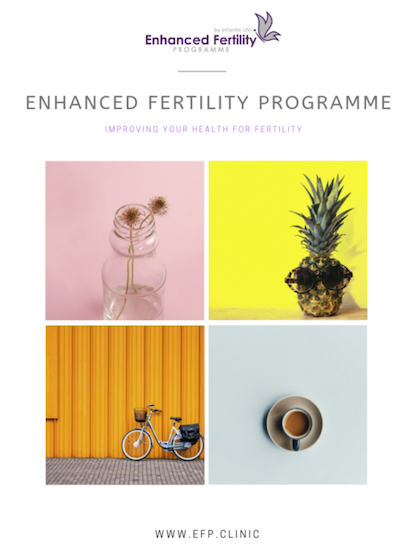Health management during fertility treatment
Fertility nurse consultant Andreia Trigo gives her expert opinion
The UK fertility regulator (The HFEA) recently published a report highlighting that in 2017, 69,822 IVF treatment cycles were performed in the UK alone. This demonstrates just how mainstream IVF treatment has become. Whilst fertility treatments are safe for most women, they are still associated with some risks and side-effects.
Gynii Me spoke to fertility nurse consultant Andreia Trigo, from inFertile Life, about how age, healthy lifestyles and emotional management can influence the outcome of fertility treatment. Andreia strongly believes that the management of health during fertility treatment – and during pregnancy – is more than a “medical” experience. In fact, Andreia’s top three tips in managing your treatment are:
- Understand the impact of both parents' age on treatment outcomes – make sure you seek advice early, ideally as soon as you are planning a family
- Make healthier lifestyle choices to improve your treatment experience – weight management, nutrition and environment make a difference
- Strengthen your support network to help manage emotional distress – find family members, friends and patient support groups who will support, encourage and inspire you at each step of your fertility journey.
Want to know more? Read our <Q&A with Andreia Trigo>

Q. Why is health management such as nutrition important during fertility treatment?
AT: “When we're talking about fertility treatments, we see that most clinics have become “overly-medicalised” and focus very much on the practicalities of the treatment itself: the injections, the medication, and the procedure.
Yet, research shows that other aspects such as nutrition, lifestyle, environmental factors and emotional wellbeing, also play an important role. Without good quality eggs and sperm, or good overall health, fertility treatments are less likely to be successful.
We're talking here about making sure that you are in the best physical, emotional and cognitive state you can possibly be, so that these treatments can be successful.”
Q. What are the main factors that affect the outcome of fertility treatment?
AT: “Number one is age. A woman’s fertility declines throughout life and at a faster rate after age 35 – maybe that's information people aren’t given when they are younger.
In society, we have this idea that men's age doesn't matter when it comes to fertility; we see men in magazines becoming parents aged 60 or 70. But men have a biological clock too and a lot of studies show that male fertility also starts declining from age 35.
We want to make sure that we can become parents and have healthy babies. Overall, it is largely about the quality of eggs and sperm, which are affected not only by age, but also by various lifestyle factors.
Surprisingly, the effects of lifestyle are transgenerational, meaning the choices of our parents and grandparents influence our health and fertility, too.”
Q. How can health management benefit babies conceived from fertility treatment?
AT: “Health management helps improve the chances of a healthy pregnancy and a healthy baby. Weight, nutrition, supplements and your emotional health during your pregnancy play an important role in your baby’s health.
If we make lifestyle improvements, such as managing our physical and emotional health, we’re reducing the risk of congenital and other health problems in our babies; one of our main goals as parents.”
Q. What can be done to deal with the side effects some women struggle with during fertility treatment?
AT: “I think many of these side effects are triggered by the medications used in fertility treatment. Being healthier allows our bodies to better tolerate these medications and can reduce the intensity of their side effects.
The biggest impact of fertility treatment has to do with emotional distress, so equipping people with coping strategies is one of the most important aspects of health management.
Many feel that nothing they’ve been through in life so far has prepared them for this experience. It’s difficult to know how to cope with it so it’s important to have someone to help navigate this journey.”
Q. What guidance do you give to couples who consider stopping fertility treatment because of distress?
AT: “Stress is the number one reason for patients to stop fertility treatment, so you are not alone. Even in countries where fertility treatment is covered by insurance, people still decide that they don't want to go ahead with treatment - because of the emotional distress. So we definitely shouldn’t underestimate the effect of emotional distress on the overall quality of life.
We need to remember that everyone's journey is different. The outcome that is right for me may not be right for you, I might be willing to try a few more rounds of treatment, whilst you may not want that.
At the end of the journey, one thing is certain; we as individuals will still be here, with or without a baby. So, we need to make sure that this journey is not all about fertility. It is all too easy to lose sight of who we are and focus 24/7 on trying to conceive. This journey will challenge you, but you still have the choice of who you want to be at the end of it. If you feel it’s time to stop, or to take a break, then allow yourself that time, because you are the number one priority.”
Q. How important is emotional management during fertility treatment?
AT: “Emotional management during fertility treatment is crucial. It isn’t just an add-on; it should be a mandatory part of the process. It helps couples understand what they want and helps them make challenging decisions about their reproductive future.
Emotional management also involves helping couples communicate. Even within couples, people can often cope differently, so learning to be respectful of different coping strategies and finding ways of meeting your needs as a couple as well as meeting your own needs as an individual is vital.
It also helps couples open their mind to alternative plans they hadn’t considered at the outset rather than repeatedly pursuing treatments that may not be working for them.”
Q. How can partners, family or friends support a woman going through fertility treatment?
AT: “Fertility doctors are so busy in the clinic that they may not put enough emphasis on emotional support throughout treatment. That’s why it’s so important for couples to create their own support network.
This can include professionals - maybe a counsellor or a coach - to give expert guidance through the emotional challenges. Choose friends or family members you can talk to, people who you value and trust, to support you at home.
It's also very important to find other people going through similar experiences, because fertility treatment can feel so isolating. Finding people who are going through the same experience can be very helpful. Some clinics run patient support groups; a great way to find those going through fertility treatment. The Fertility Network UK has volunteers running fertility support groups across the country.
Even if you are outside the UK, you can still connect with support groups on social media. Instagram or closed Facebook groups can be a huge peer-support network for those on their fertility journey.”
In conclusion, it’s important to remember that both physical and mental health management throughout fertility treatment help couples deal with treatment side effects, emotional distress and changes in their fertility plans.
Want to know more?
Andreia Trigo, RN BSc MSc, is a Fertility Nurse, Neurolinguistic Programming (NLP) Coach, author and distinguished speaker. She combines her medical expertise and one-to-one “mind-body” coaching to help individuals through their fertility journey. Andreia’s approach helps “balance body, mind and soul” and is developed from her own experience with infertility.
To learn more about Andreia Trigo’s company, inFertile Life, and how its visionary approach can support you, visit their website: https://efp.clinic

Enhanced fertility programme provided by Andreia Trigo

Connect with us